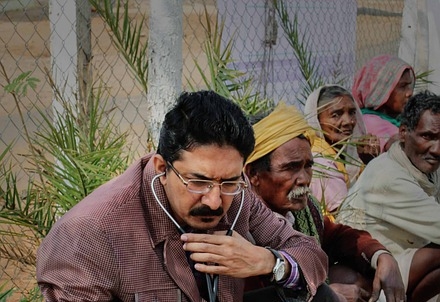Imagine a situation where central and state government departments in the country make regular public disclosures, at least one every year, of their budgets, funds disbursed, subsidies implemented, beneficiaries, licenses and permits granted, contracts awarded and so on. Imagine that a set of Information Commissioners are around for enforcement. If this alone were to come to pass, it could result in a sea change in transparency in the country.
Amidst myriad other specifics, this is precisely what the National Advisory Council to the Central Government (Chairperson: Sonia Gandhi) has put together by way of amendments to the languishing Central Freedom of Information Act (FOIA). The Act received Presidential assent in 2003, but was not notified and hence has not been in force. At the NAC's third meeting last weekend, its eminent members including leading civil society campaigner Aruna Roy and economist Jean Dreze finalized and forwarded several forward-looking amendments to the Act to the Prime Minister's office. Input for the NAC's changes were received through consultations with citizens groups nationwide.
This could not have come at a better time. Hearing a public interest litigation on the inoperative status of the FOIA, the Supreme Court recently asked the Government to complete its consultation with the states on the Central law by September 15 and either put the Central FOIA into effect or formulate interim administrative rules to give citizens access to government files. The NAC itself had recently been constituted with civil society leaders and experts to monitor and provide inputs into the UPA government's common minimum program. Undoubtedly, both major developments put transparency reforms on a faster track.
The GoK's eagerness notwithstanding, not all legal luminaries agree. Supreme Court lawyer Prashant Bhushan points out that there is no specific entry in the Union, State or Concurrent Lists dealing with the Right to Information. "It would be open to any legislative body to provide for access to information on any subject on which it has legislative competence", he clarifies. His view is that "the Central Act will override the State Acts, where there is a conflict between the two." In short, no real need for repeal, not by Karnataka, nor any other state.
In fact, the residuary power argument has an ironic history of its own. A Frontline report of December 2001 reported that in November that year, the Vajpayee government, on the request of the state governments, took a decision at the Inter-State Council meeting in Delhi to transfer the residuary power provision from the Union List to the Concurrent list. This decision arose around a different Centre-State quarrel, unrelated to RTI. What happened after that is unknown, but if the Constitution had been amended, states governments would not be able to make even the theoretical argument today that the state RTI laws need to go.
Legalese aside, the official positions of Maharashtra, Delhi and Goa are not known at this time. But RTI is seeing active use by vigilant citizens and activists in these very states, more than in Karnataka. The New Delhi NGO Parivartan has already been able to forge remarkable outcomes in PDS and public works transparency using the state law, and those developments have been widely reported. Likewise in Maharashtra, citizens are reporting increased cooperativeness from state government officials in responding to RTI requests.
The larger connection between the NAC's recommendations and the states repeal matter is this: if UPA government does not pass the progressive NAC draft as the amended Central law, the much weaker current version may come through. This law has several weaknesses - no serious suo-motu disclosures, independent appellate provisions or stiff penalties for errant officials. Karnataka law's at least allows an independent appellate authority and penalties in theory, though neither has seen serious enforcement. Maharashtra's RTI law is one of the best, and Delhi's RTI system is seeing an independent appellate authority help enormously. After all, the NAC's Amendments draft for the Central law have drawn directly from the better features of several states' laws.
So if the states repeal their somewhat better RTI laws in favour of a toothless Central law, transparency is the loser. The top bureaucrat responsible for catalysing RTI in Karnataka, Mr.Muniyellappa of the Department of Personnel and Administrative Reforms, admits candidly that this will be true for Karnataka. Also, it isn't that the states have not invested any resources into operationalizing their RTI laws. Karnataka's DPAR reports that it had recently taken several steps to notify officials state-wide for handling RTI requests as well as training officials at Mysore.
• Also: NAC filing, Aruna Roy's views
• Parivartan, Delhi
But even as the NAC remained on top of these matters, a new development has raised concern on the extent of leverage the body will really have on the UPA govt. Close on the heels of the NAC's first dispatch of recommendations to the PMO, the Union Ministry of Personnel and Public Grievances issued a draft notification of the feeblest set of rules under the current FOIA law, inviting public feedback by Aug 31. One reading of this is that the Ministry was getting ready to operationalize the current law, deliberately out of step with with the NAC-PMO interactions. Whatever be the motives, it caught many, including NAC members by surprise.
Still, the fact remains that the NAC is chaired by a person of no lesser political stature than Sonia Gandhi. Citizens expect that when the leader of the ruling alliance signs the recommendations constituting a much better Right to Information law than the current one, that will take precedence over everything else. Further, it cannot be forgotten that the basis for the NAC's work is the UPA government's own committment to deliver a more progressive Right to Information law (in the CMP). So on balance, the NAC's forward push at the national level remains encouraging. Whether the NAC's recommendations will survive or fall through the cracks is about to become the first test of the body's performance itself.























